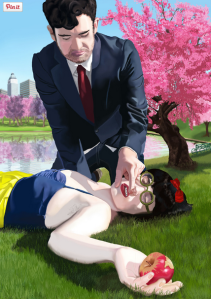Every week I read compelling stories online that I usually find via Twitter and then share via Twitter. To make sure my precious blog readers don’t miss these great pieces, I’m going to try to post excerpts from the best more frequently.

In Snow White the message is: “It is important to be beautiful on the outside in order to be rescued.”
Modern Disney Heroines: Artist Uses Contemporary Twist to Examine 5 Classic Characters
Critical analysis through art of Disney princess stereotypes focusing on the beautiful ideal, the domestic ideal and the female object as a prize.
Interestingly, this is published on Babble, which is supported by Disney “as a platform dedicated to honest, engaged, informed, intelligent and open conversation about parenting.”
The Dark Side of Marketing Healthy Food to Children
“The developmental vulnerabilities of children, along with the legal, ethical, and political pitfalls of encouraging the food industry to target kids, make marketing food to children harmful regardless of nutritional content… we are continuing to endorse a failed system in which industry gets to set the rules, break them whenever it pleases, and then take credit for doing the right thing.
Vice apologizes, pulls suicide-glorifying photo spread from Web
A new low in fashion media: Magazine fashion spread features models reenacting famous female writer suicides, with details of women’s deaths, what the models are wearing, and prices for the clothes. Online version taken down, but the print version has already been printed.
‘The apology fails, however, to take responsibility for Vice’s egregious lapse in judgment, labeling the photo shoot instead as “unconventional” and “artistic.” ‘
At The Movies, The Women Are Gone
“If she can see it, she can be it,” Geena Davis likes to say about girls and media. Once again, we see that she can’t see it:
The author counts 617 movie screenings in the Washington, DC area one day this month, finds that 561 of them — 90 percent — are stories about men or groups of men, where women play supporting roles only.
“If I were limited to multiplexes, as people are in many parts of the country, the numbers would be worse. In many places, the number would be zero…In many, many parts of the country right now, if you want to go to see a movie in the theater and see a current movie about a woman — any story about any woman that isn’t a documentary or a cartoon — you can’t. You cannot. There are not any. You cannot take yourself to one, take your friend to one, take your daughter to one.”
Mental health for men and gender stereotyping
“Just as many girls can be immensely harmed by the impossible cultural demands to be pretty, slim princesses, so too are many boys immensely harmed by exhortations to never cry, toughen up and be a man. Please, let our children be children.”



